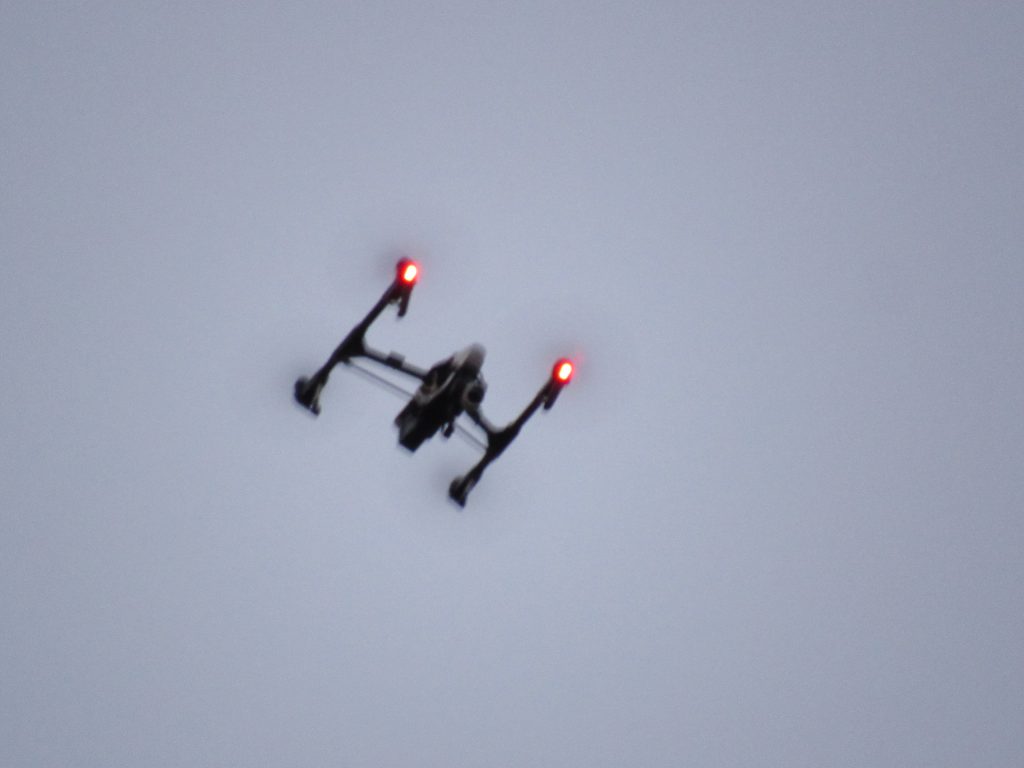Bill Would Expand Law Enforcement Drone Use
Bill covers corrections facilities, but one sheriff said it would help protest surveillance.

A drone hovered overhead on the first day of demonstrations. Photo by Isiah Holmes/Wisconsin Examiner.
An Assembly Committee on Corrections hearing into a bill that would allow law enforcement to fly drones over Department of Corrections (DOC) facilities offered a look into the future of drone usage in Wisconsin. The bill, AB-211, introduced by Rep. Calvin Callahan (R-Tomahawk) as well as several other state representatives and senators on both sides of the aisle, was designed to end an ongoing prohibition against drone flights over DOC airspace.
“The idea for the proposal was brought to my attention by staff of the Department of Corrections earlier this session and has since received bipartisan support,” Callahan said during the hearing testimony. “ In 2015 Wisconsin Act 318 prohibited a person from operating a drone over a correctional institution or grounds. This included state prisons and county jails.”
Sen. Dan Feyen (R- Fond du Lac) added, “Giving the Department of Corrections the ability to fly drones will allow greater visibility in open-air areas of the facilities. This will increase sight lines and security, and allow eyes and ears in places that might otherwise be inaccessible.” Beyond potential security roles, Feyen pitched drones and their related technologies as more advanced and reliable ways to perform maintenance checks of facilities. “This makes drones a very effective tool that can be used at the department’s disposal,” said Feyen.
AB-211 not only applies to DOC facilities, but also those under the jurisdiction of the county sheriff. Dodge County Sheriff Dale Schmidt also testified, though some of his comments implied the bill could allow for more freedom in drone operations. Schmidt was enthusiastic about the bill and about drones in general, noting that as a child he wanted to become a cop and a pilot. Through his department’s drone program, the sheriff has accomplished both those goals.
Schmidt emphasized the security benefits of flying drones. “Not only for security and maintenance, but in the current times we see ourselves with more individuals protesting outside, illegally protesting outside. And, sometimes, those things need to be monitored and having that aerial footage available is really helpful.”
Later he added, “We have had individuals who have stated that they wanted to come and close down some of the streets, illegally I might add, in front of some of our institutions. And that hasn’t happened, that hasn’t come to fruition yet. But with some of the times that we’re in, we don’t know what’s going to happen. And having that ability to fly a drone above these facilities so we can monitor that, and take appropriate action would certainly be more favorable than putting troops on the ground and monitoring it that way. And certainly, we want to have as hands-off an opportunity as we can. This allows us to do that.”
The committee hearing offered some insights into the state’s technological capabilities, and the potential future of drones in Wisconsin. Chief information officer for the DOC and commercial drone pilot Tommy Ballistrari, who helped found the DOC’s drone and unmanned aircraft system program, answered questions about what could be done to prevent unauthorized drones from entering DOC airspace.
“We’ve spent a lot of time investigating different technology out there to detect drones,” explained Ballistrari. Federal law prohibits tampering with a drone in-flight, meaning that you can’t just shoot it down. Some legislators raised the possibility of using technology that jams signals to down unwanted drones. Ballistari stated that such technologies “do exist to jam signals but it violates both the FAA sabotage law and the FCC Telecommunications Act of 1935, which says that you can’t jam signals. So we have our hands tied a little bit, but we have been looking at drone protection systems.”
After Ballistari’s comments Rep. Michael Schraa (R-Oshkosh), who chairs the committee, warned, “I would also guess that the DOC wants to keep close-chested some of the technology that you’re talking about. We are on Wisconsin Eye and, if there is technology out there I don’t think we want everybody knowing about that technology.” Mention of confidential technology capable of jamming signals is interesting, as many protesters have said they believe their phone signals have been interrupted or jammed by law enforcement on various occasions.
Others testified in favor of the drone bill from a private sector point of view. Businesses that specialize in drone technology to help survey properties or buildings for renovations are also limited by current legislation. In the future, if such businesses were to become interested in producing armed drones for military customers, they would have to move out of Wisconsin. Additionally some drones, such as those purchased by MCSO, are produced by foreign countries that could have interest in the data they collect. Schraa noted after testimony from Wisconsin drone businesses, “Hopefully that business stays right here paying lots of taxes.”
Then he adjourned the meeting.
Reprinted with permission of Wisconsin Examiner.





















